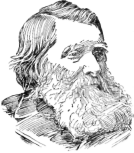RUPERT 1644 RUSSELL
Description
This page of the book is from "The New Student's Reference Work: Volume 3" by Chandler B. Beach, Frank Morton McMurry and others.
RUPERT 1644 RUSSELL
plant, which take root at the tip and produce new plants. The runners of the strawberry and of the eel-grass are well known,
Ru'pert, Prince, third son of Frederick V the Elector Palatine, and Elizabeth, daughter of James I of England, was born at Prague, Dec. 18, 1619. He studied at Leyden and served in 1637-8 in the Thirty Years' War till he was held prisoner for three years. In 1642 he went to England in time to take part in the Civil War. For the next three years the Mad Cavalier was the life and soul of the Royalist cause, winning battles by his resistless charges, only to lose them by too headlong pursuit. In 1645 he surrendered Bristol after a three weeks' siege. This so angered Charles that he sent him his passport to leave the kingdom. A court-martial, however, cleared him of all blame and he again became general of his uncle's forces, only to surrender to Fairfax the following June. In 1648 he became admiral of the part of the English fleet that remained true to the king, and acquitted himself with old daring and new caution. In 1651 most of his vessels were burned or sunk in a battle with Admiral Blake. Rupert escaped to the West Indies, where he led a buccaneering life. In 1653 he went back to Europe, and, after the restoration, served with Monk against the Dutch. His last ten years he spent in study. He improved the art of mezzotint, discovered an improved gunpowder, invented the composition known as prince's metal and, perhaps, the curious glass-bubbles called Prince Rupert's drops. He was a founder of the Hudson Bay Company and of the Royal Society. He died, Nov. 29, 1682. See Lord Ronald Gower's Rupert of the Rhine.
Rupert's Land. See Canada, Hudson Bay Company and Northwest Territories.
Ru'rik, a Scandinavian adventurer, who in 862 A. D. became ruler or overlord of a part of Russia, with his court at Novgorod. He sometimes is styled the founder of the Russian monarchy: the Rurik dynasty gave 67 rulers to Russia and lasted 736 years (to 1598), becoming extinct then with Feodor. The seventh of the line (Vladimir I, the Great) introduced Christianity; Ivan the Great (or John III) unified the kingdom and first assumed the title of czar (tsar). See Romanoff, House of.
Rush, Benjamin, was born near Philadelphia, Dec. 24, 1745. He graduatedat Princeton in 1760, studied medicine in America and Europe, and became professor of chemistry in the Philadelphia Medical College. Dr. Rush was a member of the continental congress and a signer of the Declaration of Independence. He was a founder of Philadelphia Dispensary, the first in America, and of the College of Physicians, and Ivas given several medical professorships besides the one he already held at Philadel-
phia. During the yellow-fever epidemic of 1793, he was a devoted worker and successful in his treatment. In 1799 Rush was made treasurer of the United States Mint. Among his medical writings, which were honored at home and abroad, were Medical Inquiries and Observations, Essays and Diseases of the Mind. Dr. Rush died at Philadelphia, April 19, 1813.
Rus'kin, John, the great art-writer, was born at London, Feb. 8, 1819, the only child of a wealthy wine-merchant. He took his degree at Oxford in 1842, and studied painting under Copley. The story of the earlier years of his life has been told by himself in Prœterita, one of the most charming autobiographies in any language. In 1843 came the first volume of Modern Painters, which treated the principles of art in an independent and even revolutionary way. Though greatly opposed at first, Ruskin's views have largely determined the character of later English art. In 1849 appeared The Seven Lamps of Architecture and two years later The Stones of Venice. The titles of Ruskin's books often give no indication of the subject. Notes on the Construction of Sheepfolds deals with church-discipilne ; The Crown of Wild Olive consists of four essays on work, traffic, war and the future of England; Sesame and Lilies, lectures on good literature; The Queen of the Air, on the Greek myths of cloud and storm ; Ethics of the Dust, lectures on crystallization. From 1869 to 1879 Ruskin was professor of art at Oxford. Ruskin is noted for his splendid style, which for eloquence, power and richness hardly has any equal. In art he tells us that he aimed to set forth the "supremacy of five great painters, despised till he spoke of them — Turner, Tintoret, Luini, Botticelli and Car-paccio." His Munera Pulveris deals with political economy, on which he wrote from an independent point of view. See Cook's Studies on Ruskin. He died at Brantwood, in the English lake-region, Jan. 20, 1900.
Rus'sell, John, Earl, English statesman, was born on Aug. 18, 1792, at London, the third son of the duke of Bedford. He studied at Edinburgh, and entered Parliament in 1813. In 1830 the Liberals came into power, and, though Russell was not a member of the cabinet, he was one of four who framed the first reform-bill. In 1835 he became home-secretary and leader of the house of commons, and introduced most of the important bills passed at this time. In 1839 he became colonial secretary. In 1846 Russell became

JOHN RUSKIN


